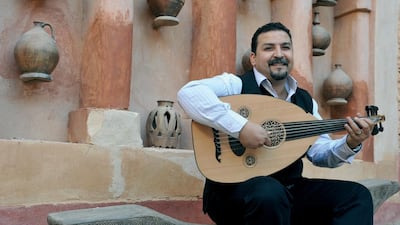Two diverse musical traditions will orbit and fuse when Moroccan oud master Driss El Maloumi is joined onstage by Hindustani slide guitar wizard Pandit Debashish Bhattacharya.
Hosted at NYU Abu Dhabi’s Arts Centre, on Thursday October 27, this cross-cultural “string summit” revives a partnership between the two virtuosos which stretches back a number of years.
Here 46-year-old El Maloumi spells out what to expect from this sympathetic union of sound.
When did you first encounter the music of Debashish Bhattacharya, and what were your first impressions? What was it that attracted you towards a collaboration?
Debashish approached me for a collaboration at the Festival Détours de Babel in France, where we composed a piece together highlighting the value of music history and a profile of both our cultures. We shared a stage and it was a great collaboration which resonates with me till today. We had moments of anxiety, joy, disagreements, many discussions, and it was the perfect recipe to create a piece that respected both our cultural legacies and gave each of us the space to achieve the same “creative madness” in our work.
Tell us about that first performance together, in Paris in 2009.
Of course! Our first performance was the premiere in Paris and we had a lot of pent up anxiety, which is of course natural with new experiences. However, we believed that our music had humanitarian depth and joy while being out of the ordinary and encompassing chaotic energy. That was our real motive. Working together was great fun and together we met the challenge to create a piece that respected history; as we still do to this day.
How many times have you played together subsequently, and when was the last time?
We continued to perform together in France, Morocco, and France again and we have now arrived in the United Arab Emirates, which is wonderful. Every time we perform together, we are filled with wonder and more questions and more challenges. This energy and wonderment is vital to our project and its development.
What key similarities and core differences do you find exist between the traditions of Arabic and Hindustani classical music? How do your two instruments compliment and contrast with one another?
Music is how we express ourselves. We have found a way to translate each of our cultures’ knowledge, and social and political stances through our instruments.
Personally, I grew up in a cultural environment that encouraged curiosity and creative work and was conducive to artistic thinking. I say this, while keeping in mind Indian, Arab and European, Chinese and African-American music with the same passion I hold for human creativity and triumph.
Technically, Indian and Arab classical music have similarities in key and tone, improvisation, melody and many other elements which prevail today – all of which I respect. We do not present either Arabic or Indian music, but an amalgamation of both and that is what inspires my work.
You have worked with musicians from many pockets of the globe. How and why can the organised sound of music help bridge cultural barriers?
I am very proud to have had the experience to work with many musicians and I believe I still need to continue on this journey. I have played the oud in many continents around the world and across many genres such as jazz, classical, and improv.
Music celebrates the human condition and I believe it is my destiny to play and I am very proud of it. I will continue to work on this musical path as a way to defeat the misery across the world.
You will be visiting Abu Dhabi again early next year to perform alongside Jordi Savall, as he presents his latest work inspired by the travels of Ibn Battuta. What can you tell us about this concert, and working with Jordi generally?
Jordi Savall is a great legend in his beautiful silent war on music. Every time I work with him he inspires great calmness with his spirit and persistence on the advancement of music in spite of all the temptations and challenges.
He is very much like the character Ibn Battuta and our work is titled Ibn Battuta, which we will present to the UAE early next year.
We have had the honour of presenting the first segment last year in the UAE.
Our next step is the continuation of a beautiful journey to celebrate the human spirit and increase the level of humanity in us.
Anything else to tell our readers?
My sincerest regards to all of you. As the great saying goes: “We have on this earth what makes life worth living.” Focus on humanity and be proud of who you are.
Driss El Maloumi and Debashish Bhattacharya perform at The Arts Centre (East Plaza), NYU Abu Dhabi, on Thursday October 27 at 8pm. Register for free tickets

